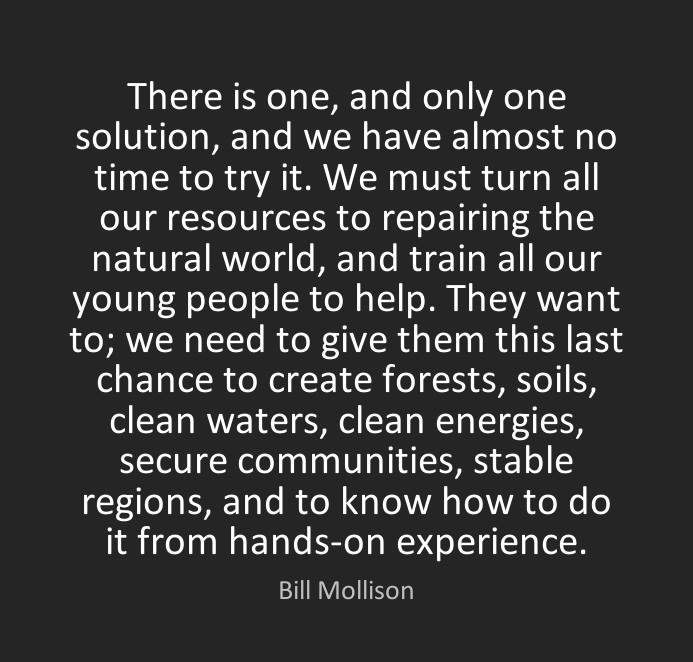Podcast: Play in new window | Download
Subscribe: RSS

I never knew Bill Mollison. I have known of him for only a few years. But his vision has touched — in fact, transformed — the core of my being. As long as I live I will honor him for a vision that has vastly improved the way I understand and react to the world, a vision that could have vastly improved the world itself, had we listened to him in time.
Mollison, along with David Holmgren and others, was a principal founder of the Permaculture movement, a way of looking at agriculture with emphasis on symbiosis among plants, including trees and other perennials; the soil, with its myriad components and organisms; and the climate with its gifts of rain, wind and sunshine. This contemplative way of farming — permanent agriculture — has since its advent in Australia in 1968 morphed into a way of looking at life itself — permanent culture.

Bill Mollison, father of Permaculture
The most important thing about the way Bill Mollison thought about the world, in my view, was this: he was not an expert. In his life he was a baker, a trapper, a fisherman, a forester, a cattleman, a bouncer and a mill worker. Sure, he got an academic degree, and spent time in academia, but not, as experts do, learning more and more about less and less. He was a generalist, who when he looked at life saw a marvelous web of relationships, not a simplified, straight-line diagram of causes and effects.
What Bill Mollison saw when he looked at the world was what the native American Lakota called “Wakan Tanka” — the Great Mystery. Permaculture teaches us to study the processes of nature at great length, but not, as modern humanity supposes, thinking we can understand it completely and take over its management, but in the hope we can learn enough to get out of its way, avoid destroying it, maybe even one day make a contribution to its well being.
The practice of Permaculture as codified by Mollison requires us to shed like old snakeskins many of the attitudes and assumptions that are so basic to modern life we seldom think about them, let alone question them. Before we can even begin the practice, for example, we and our family have to make a multi-generational commitment to live on and work with a piece of land, because much of the abundance to be had from Permaculture may not appear in our lifetimes. In a country where people move every three years, on average, this is a strange concept.
The practice of Permaculture, Mollison taught us, requires less and less work over time. One puts things in place, and then lets them be. One gradually returns to the life most familiar to the human race over hundreds of thousands of years, that of the hunter-gatherer. And instead of the life of grueling labor and frequent famine, described by the apologists for chemical-industrial agriculture, it turns out to be a life of ease and plenty. Sort of like the Garden of Eden, before we brought in Monsanto.
The prospect of surviving the crash of the industrial age is more than daunting when we think about growing our own food (and defending it) in the ways that have become familiar to us in the past two centuries. But those who have a mature food forest with which to face the days after tomorrow have much less to fear from either deprivation or depredation. (It’s what made the potato the staple food of Ireland; hay and corn and livestock and preserved food were easy for the omnipresent British soldiers to steal or destroy, but it was just too much damn work to dig all those potatoes.)
So thank you, Bill Mollison, for opening my eyes to the Great Mystery, for relieving my mind of the lust to comprehend nature in order to control it, freeing me to simply sit in the midst of the Great Orchestra and hum along with delight. You came to me too late, as you came to the world too late, to save us from the consequences of our arrogance and greed, but not too late to give us, in what would otherwise have been an unbearably Dark Age at the closing of our lives, a lustrous hope for renewal.
Accept the thanks of a grateful world, Bill Mollison, and rest in peace.
Thoughtful, heartfelt comment Mr. Lewis.
I heard about this way of doing things at the height of my “hippie” days (’67 – ’69) when people were seriously trying out alternative ways to be present in the moment, attending to what needed to be done. With the help of the Whole Earth Catalogue and finding out about permaculture in college, it looked like the way to live. Then life got in the way and only remnants of it remain.
The atmosphere is poisoned now, as are the waters, and the weather is uncooperative and unpredictable now. What needed to happen was we had the chance to change our energy sources from fossil fuels and fission to another, more harmonious way of enhancing human labor (not replacing it). Reality interrupted that dream as the global forces of the status quo didn’t “buy in” and here we are.
The bigger problem was one that no one talked about – curbing human population. I remember the zero population growth movement, that went no where and drifted away from the public consciousness during that time, again sabotaged by the vested interests in keeping everything human “growing” without ever questioning when to stop. Again, here we are.
It was good while it lasted.
‘Boll’ Holmgren? His name is David.
Sorry. Mental circuit breaker popped.
A powerful, contemplative essay, Mr. L.
Ways of life that expose the dead scams of the money changers and their twisted compatriots will never find favor, much less support from that power structure.
Like it or not, philosophies akin to permaculture, which support and affirm life, exist in defiance of the wishes, wants, and plans of the power structure.
That which brings us into rhythm with the Good cannot be commodified, packaged, depreciated, perverted, or genetically modified. This makes it a threat to those petty rulers, those money managers, whose power is found only in negation of the life force.
Taken thus, the condition of global society and environment is only to be expected.
Ideas like permaculture, like John Todd’s “living machines” and so many others are not lost, they arrive to rekindle the torch that must be carried through this dark time. We can mourn the passing of Mr. Mollison, yet we should celebrate the light he brought to us all.
My wife visited his abandoned (due to an impasse with a local gov.) farm when she was studying Permaculture in Australia. Though unattended by humans for some years it was still producing a good deal of food which they picked and ate. I expect that if people of the future ever think kindly of us it will not be for the techno geegaws we might leave behind but because of knowledge and ideas of people like Mr Mollison. We should do our best to see that his wisdom is not lost as we pass through the bottlenecks of de-industrialization.
We have no commitment from any of our children that they will take over the small permaculture we are creating on the space we have but that is okay. Some humans from somewhere will find it and hopefully it will provide them some food, at least until the sea takes it, we are not that far above sea level.
Thank you for honouring Mr Mollison, in a sane world his passing would be front page news.
Mollison and Holmgren: truly authentic, inspiring humans. In case you haven’t, check out one of their authentic human inspirations: Masanobu Fukuoka. i just called him “Fuki”…Start with ‘One Straw Revolution’, the revised version with a forward by Wendell Berry. There are 2 others in English translation.
Zen meets Earth, the most beautiful planet in the Universe.
Thanks for the tribute to Bill, I thought the world had basically forgotten about him and Permaculture. Alas it was the clash of civilisations, large scale agribusiness and monoculture in horticulture and agriculture generally that relegated what was a very sensible way of looking at the world and food production. Well we have been putting into place a permaculture system, in other words, variety and variety and it works. We use no pesticides or herbicides and have not done so since we started but the changing climate is now a very challenging problem and trying to work with the variability is becoming to say the least difficult. Still permaculture is the mind set that helps us deal with that because we have in that philosophy the capacity to think of other stuff that will survive the changes I can say for sure are permanent now and as a result we are replanting and adding plants that I know will cope with stress that more tender or zonally challenged plants did not.
The great tragedy is that really apart from a few, nobody listened to the core knowledge which Bill synthesised from the wisdom of the past, of getting in touch with the mystery of life and the great web of life that sustains all living things.
Beautiful essay, perhaps among the very best on Daily Impact. DI has changed, it started with Tom’s time off and then a refocus. Began with the discussions of the Virginia Indian Villages and the lessons learned. We’ve repeatedly covered the bad, the things that cause us despair and worry, but that we personally can only have a minor effect on, ex climate change. With something like permaculture principles we can have a greater impact and see our results and progress daily and going froward. I sense that DI will move on to cover more of these things that inspire us and that we can truly aspire to. Let’s continue to cover the people, leaders, teachers, places, practices, companies and policies that inspire us to make these positive changes.
Thanks for the good thoughts, Steven.
Right, Steven. We must keep our eyes averted from what’s really going on so we can enjoy ourselves and feel all warm and nice . . .
Here’s some positive changes:
Thursday, 29 September 2016
Mass arrests at Dakota Access pipeline
Military-Style Raid Ends Native Prayer Against Dakota Pipeline
Up to 21 people were arrested during a peaceful prayer service.
Live video: “They dropped tear gas, we are surrounded by police.”
”They are moving in.”
”They won’t let us leave. They have us locked in on both sides.”
”They’ve got their weapons drawn.”
”They’ve got snipers on top of the hill.”
”They are blocking me on Facebook.”
”They are arresting everyone now. Everyone is running.”
”Share this far and wide.”
Canada approves $36 billion LNG ‘carbon bomb’ on B.C. coast
http://www.desdemonadespair.net/2016/09/canada-approves-36-billion-lng-carbon.html
“In the wake [of] the Paris Agreement to curb carbon emissions and limit global warming to 1.5 degrees above pre-industrial levels, we no longer have the luxury of entertaining proposals that would substantially contribute to increased GHG emissions at home and abroad.”
Justin Trudeau approves $36-billion LNG ‘carbon bomb’ on B.C. coast [more]
“We are Suffocating from Smoke” — For Russia, Climate Change is Already Producing Fires that are Too Big to Fight
https://robertscribbler.com/2016/09/28/for-one-month-we-are-suffocating-from-smoke-for-russia-climate-change-is-already-producing-fires-that-are-too-big-to-fight/
High methane readings
Methane at 2629 ppb
http://robinwestenra.blogspot.co.nz/2016/09/high-methane-readings.html
Methane high 09 27 2016, 2629 ppb.
Keep in mind that 1250 ppb is the energy balance for methane. Anything over this and the atmosphere absorbs more heat than it disapates [sic]. The atmosphere is heating up like a plugged radiator on a car. It cannot disapate [sic] heat fast enough.